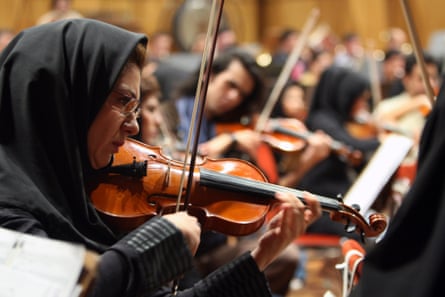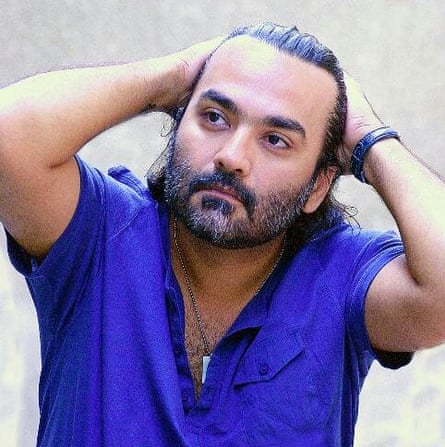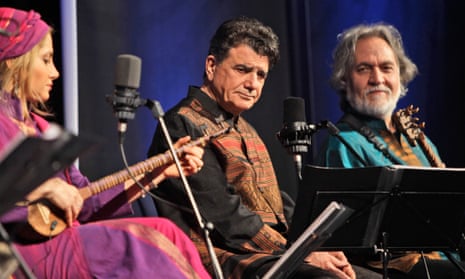Hardline sympathisers in Iran have been causing the abrupt closure of concerts, intimidating musicians in a show of force aimed at the moderate administration of President Hassan Rouhani.
Although it has become easier to perform music since Rouhani came to power, an increasing number of performances, including one by Tehran’s reborn symphony orchestra, have been cancelled at the last minute after intervention from forces that remain unknown to the artists.
The cancellations are becoming a major challenge for the president, who is being urged to shift his attention to domestic issues after resolving the impasse over the country’s nuclear programme. Hardliners, unhappy with the way the nuclear accord boosted Rouhani’s status at home, are making sure he will have a tough time ahead in the remaining two years of his presidency.
In a recent incident, the Tehran symphony orchestra, which has been revived after a three-year hiatus and was last week due to perform the national anthem at the capital’s majestic Azadi stadium before a wrestling world cup competition, had to cancel because the authorities insisted 15 minutes before the programme that female musicians should not perform on the stage.

“I told them that this was unacceptable and did not allow the performance to go ahead,” its principal conductor, Ali (Alexander) Rahbari, told the Guardian. “We didn’t know who they were, or where they came from but they blocked our way even though we had permission. It’s complete chaos. You don’t know whose fault it was at the end.”
The orchestra is an institution which has weathered a string of turbulent events in its 80-year history, including a coup, an eight-year war and a revolution. In March, it was brought back to life after being fully disbanded under the former president, Mahmoud Ahmadinejad, thanks to Rahbari, a world-class conductor who has led more than 120 European orchestras, including the Berlin Philharmonic and London Philharmonic.
Such acts of cultural sabotage are becoming a familiar pattern. Numerous other concerts have been cancelled in recent months in Tehran and other big cities. Artists, who already face draconian regulations before securing permission for a concert, say Rouhani’s ministry of culture and Islamic guidance is not directly responsible but has failed to act or speak out.
Rouhani, pressed about the issue earlier this year, said: “When we issue the necessary licences, it’s wrong for other institutions to intervene.” Hardliners have since shown, however, who has the upper hand.

Kayhan Kalhor, one of Iran’s most renowned musicians, with four Grammy nominations, has experienced similar obstacles. He was scheduled to perform at Tehran’s Milad Tower in June alongside the Brooklyn Rider, a New York-based string quartet, but their concert was cancelled just days before. It was meant to be Kalhor’s first Iranian concert in six years and was organised a year in advance.
“Brooklyn Rider had got their visas and people in Iran were very happy to host them but at the very last moment, we were told that there was a security concern,” Kalhor, who plays the kamancheh, an Iranian bowed instrument, told the Guardian. “The pressure comes from a sector of unknown forces; we really don’t know who they are. There are several different fronts who are actually against Rouhani’s government and they possess a lot of power.”
Kalhor added: “They create problems in order to create chaos, somehow create disappointment for people who voted for this government. It’s always been like that for any reformist government.” The musician, who strongly supported Rouhani during his campaign, said he still has faith in his will but wants him to speak out and do more.
According to Kalhor, the pressure is mostly on musicians and the section of the intelligentsia which is well known and has followings among the younger generation. Iran’s great master of Persian classical music, Mohammad-Reza Shajarian, has also not been allowed to perform in the past six years.

“The minister of culture is just watching this in silence,” he said. “This is not what we expected from Rouhani when he ran for the presidency. Intellectuals and distinguished artists helped him a lot and we understand that there is a lot of pressure on him, especially they have the job of rebuilding the economy and getting rid of sanctions. He should not forget that artists helped him a lot. We expect him to do something about this worsening situation. It is becoming prevalent.”
Pressure on Iranian artists is not only limited to their performances. Earlier this week Yaghma Golrouee, a well-known poet and songwriter, was arrested a few weeks after publicly criticising the authorities for not allowing his book to be published. It also emerged this week that the authorities had blocked the country’s only non-governmental literary prize, called Aknoon. The state runs its own literary award, named after writer Jalal Al-e-Ahmad, which is usually a lacklustre event despite its eyecatching prize of 30 gold coins.
Rahbari said musicians should not have to obtain permission to stage concerts in the first place. The orchestra was also not allowed to perform Mozart’s Requiem last month. “What’s the use?” he said. “When the authorities ban music on stage, people hear it in taxis. When you ban, people go underground. Mozart’s music has hurt nobody, there is no bad music, good music. This is entirely arbitrary.”
